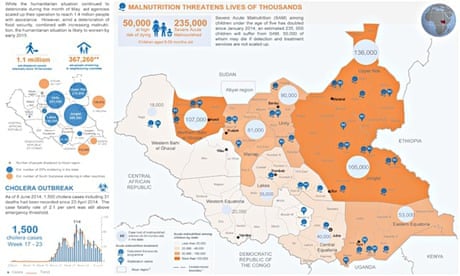The UN is appealing for more than $1bn in emergency humanitarian funding for South Sudan, warning that six months of fighting have left the country facing famine and the "loss of a generation of children and youth".
Launching its latest crisis response plan, the UN said it had so far received just $739m (£545m) of the $1.8bn it needs to cope with the devastation that has engulfed South Sudan since civil war broke out in December. Without sufficient funding for the rest of 2014 and the first three months of next year, it added, South Sudan will suffer catastrophically.
"If we are not able to deliver aid, every second severely food insecure person will not get help against hunger and starvation," says the report. "Up to 50,000 children could die from malnutrition. Cholera may not be contained. Tens of thousands could die from other killers, including measles, pneumonia, malaria and failed child births. Hundreds of thousands would not be able to rebuild their shattered lives."
Thousands of people have been slaughtered, more than 1 million displaced and almost 5 million are in dire need of humanitarian assistance as a result of the violence in the world's youngest nation.
The conflict – which erupted after President Salva Kiir accused his vice-president, Riek Machar, of plotting to overthrow him – has split the country along ethnic lines, sparking clashes between Kiir's Dinkas and Machar's Nuers.
In a report last month, the UN laid out gross human rights violations – including ethnic-based killings, rapes, revenge attacks, and the deliberate targeting of civilians – on what it termed "a massive scale".
Navi Pillay, the UN high commissioner for human rights and former president of the international criminal tribunal for Rwanda, said she recognised in the report "many of the precursors of genocide".
Toby Lanzer, the deputy special representative of the UN secretary general in South Sudan, said the fighting had torn apart communities that once lived together peacefully.
"Men, women and children have fled from their homes and sought refuge in the bush, inside UN bases, and in neighbouring countries," he said.
"With many communities unable to farm or tend properly to their cattle, the risk of famine looms large. In some particularly hard-to-reach areas of the country, people are already starving."
Lanzer said he had been encouraged by the ceasefire brokered during talks in Ethiopia last week, but time was fast running out.
"Even if the violence were to stop, great damage has already been done," he said. "The immediate goals of the aid operation are to save lives and prevent a famine. But we also have our sights set on the future. By vaccinating children, keeping schools open, and helping people cope with trauma, we strive to avert the loss of a generation of children and youth to this conflict, and help the country recover once fighting stops."
Lanzer said the international humanitarian community was ready and able to help millions of South Sudanese to survive as they wait for an enduring peace.
"We have set clear priorities among the overwhelming needs; we have a strategy that works; and we are able to implement it," he said. "With the continued generosity and solidarity of donors around the world, we can help prevent more unnecessary death and despair. Every dollar counts and makes a difference to people's lives."
The UN warning was echoed by Oxfam.
"The people of South Sudan have been exposed to a triple crisis – conflict, hunger and disease – and with the rains now in full swing, the situation only stands to deteriorate," said the charity's country director, Emma Jane Drew.
"If we don't significantly scale up the response, 4 million people will go hungry in the coming months. This six-month mark is a harrowing reminder of the devastation caused in this short time and scale of need in this young nation."
The Famine Early Warning Systems Network (Fewsnet) has reported a major food security emergency in South Sudan's Unity, Upper Nile, and Jonglei states.
It said: "While the forecast is positive for the south-west – an important surplus-producing zone – it suggests an increased likelihood of below-average rainfall in the conflict-affected areas, where displacement and seed shortages have already compromised land preparation and planting."
